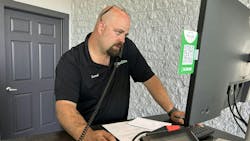Tire Dealer Survival Guide: How to Connect With Customers By Phone
When I was in a training meeting one evening with about 40 to 50 tire store owners and their wives, I asked the question, “When you are standing at the counter and you have one customer in front of you and the phone is ringing beside you, which one is the most important customer?”
Only five out of 50 had the right answer, with 45 saying, “The customer in front of you.”
But five owners said, “The one on the phone that you don't have in the store yet.” Those five tire dealers were right.
If you know how to use great phone skills, you can ensure that every customer engagement is memorable, meaningful and measurable.
The only challenge is that many counter salespeople are so caught up in the whirlwind of running a busy tire store that they do not understand the value of a good process and they understand the value of using the right words at the right time and in the right place during every phone call even less.
And the right time is just as important as the right words. Most tire salespeople use silence and meaningless banter as they look up a tire price.
So what does “using the right words” mean?
Using the right words in the right place is often not using any negative words until you have been on the phone with the prospect or customer for at least 30 seconds.
In my work, I’ve observed many tire retail salespeople as they’ve talked with customers on the phone. One thing I’ve discovered is that people who pick up the phone and have a very positive greeting will convince people to buy more. Notice I did not say “sell more.” Why? Because today's consumers will buy more if they do not feel like they are being sold something.
I’ll never forget being at one of my clients’ tire stores on February 14, Valentine’s Day, and hearing his greeting. I had already challenged that store’s salespeople the night before to be creative and not sound robotic when they answered the phone.
On this special day, I was standing at the counter with him when the phone rang. He enthusiastically answered and said, "Nothing says ‘I love you’ like a new set of tires on Valentine’s Day from Rick Johnson Tire! My name is Alex. Who do I have the pleasure of speaking with today?"
I could literally hear the customer through his handset laughing and telling him how he had made her day and that she was heading down to the store to meet him and get some pricing on tires.
Was his greeting memorable? Absolutely! Did it produce a buyer for his store? Of course, it did. And even though calls don't all turn out like this, his greeting set the tone for the entire customer engagement.
To be able to give a customer a compelling reason to buy from you, it’s important that the phone call is memorable. Believe it or not, most tire store front counter salespeople answer the phone with, "ABC Tire. Please hold.”
This is bad on many levels, including adding more work for the counter sales team. How? I’ve listened to hundreds of calls and at least seven out of 10 are calls that could have been deflected to another team member if the sales associate had engaged in a more effective way and determined the need for the call.
Determining the customer’s need helps decrease stress so both the customer in front of you and the customer on the phone have a better experience. If only the salesperson mentioned above would have slowed down with a proper greeting like, "Thank you for calling ABC Tire today. My name is Mike. Who do I have the pleasure of speaking with?” followed by getting the caller’s name and asking how he could help.
What would have been the next step after securing the caller’s name and determining the need? Asking for permission to put the customer on hold. Some salespeople think this process takes too long. It takes less than 25 seconds!
But understand the customer’s need as soon as possible. If a salesperson puts a customer on hold and that customer waits for two to four minutes, only for the salesperson to find out the customer was only checking to see when their 2020 Honda Accord would be ready, more stress will be placed on the customer, as well as that salesperson and his teammates.
If your salespeople are uncomfortable putting a customer on hold, an appropriate response would be, "I will call you back in five minutes.” And then follow through. That, too, can be memorable. I can guarantee that a three- to four-minute hold to answer a five- to 10-second question is not a good way to create a good experience.
Every customer interaction should also be meaningful. This is how the customer perceives the call. For a call to be meaningful, your salespeople must engage with the customer in one of three ways: as a trusted advisor, as a hero or as a companion.
The problem is that most salespeople answer the phone without a process that includes all three, even with regular customers. Imagine a technician trying to take off a wheel using an old lug wrench when they had access to a new impact wrench. A salesperson who uses words incorrectly or uses a poor or robotic greeting will cause — many times unintentionally — a customer to see them as unprofessional and therefore not connecting as a trusted advisor.
Being a hero to the customer, many times, is easier. But most of the calls I hear fail miserably at this. Here’s an example. A customer calls in with a flat tire and the sales associate immediately asks, "Do you know the tire size?" Wow! That salesperson just missed an opportunity to connect emotionally with a potential customer or a current customer. Why not say, "I'm sorry this has happened and messed up part of your day, I will try to make things better for you from this point forward. Now, Mrs. Smith, would you happen to know your tire size?"
It’s not about selling something to the customer. It’s about connecting with the customer as a fellow human being who wants to help. This is how a salesperson can come across as a hero.
How do you connect with a customer as a companion? This can be a tough one for your salespeople unless they have a good manager and/org a good support staff.
Many times, connecting can come in the form of doing something extra for a customer that costs you little or nothing, like walking a customer to their car and thanking them for their business as you remind them to come back for their tire rotations. It could be how you follow up to see how their car is doing after a major service.
Being a companion can be as simple as showing empathy. And when thinking about empathy, remember that the term includes the word “path.” Put yourself on that customer’s path.
Making a phone call memorable and meaningful can be measured by how your salesperson chooses his words. Even though this sounds easy, I can guarantee you it takes a dedicated individual to master the use of words on the phone.
I compare words and compilations of words to the tools in a tool box. Imagine if one of your technicians came up to a car, raised the hood and then dumped all of his tools on the ground in front of the car. This is precisely what happens when a salesperson uses too many words or uses the wrong words at the wrong time or does not know how to fill silence on the phone.
Remember that using the wrong words is just as bad, if not worse, as a cause of losing the impact of customer engagement. The fact that a customer calls your dealership is proof he or she wants to do business with you.
Don’t let a salesperson unintentionally talk them out of it. (When this has happened, a customer will often say, "I have to call a few more places before I make a decision.”)
Many times, when a salesperson says things that could either be stated in a better or different way, the outcome is customer disengagement, whether it’s on a phone call or in person.
Your salespeople should also be wary of using words that imply the customer cannot be helped.
Tell the customer what you can do. Speak in definites: “I can order that tire. I can get you in tomorrow morning. We have several more economical options available.”
Salespeople who want to convert an everyday phone call into a memorable, meaningful experience should never use the words “we don’t” or “we can’t.” They should always make an “I can” statement, even if a higher price has to be mentioned. And avoid “filler words” like “um” or ending a sentence with merely an “OK.” These also can prevent a memorable, meaningful experience from occurring.
At the end of the day, it’s important for salespeople — especially when working with busy consumers — to be somewhat of a wordsmith, arranging their words in an order where they flow, sound professional and establish rapport. And don't forget to ask the customer to make a commitment.
About the Author

Mike Townsend
Mike Townsend is the owner of Townsend Strategies, a sales and leadership training and marketing company that advises independent tire dealerships. To contact Townsend, email him at [email protected].
